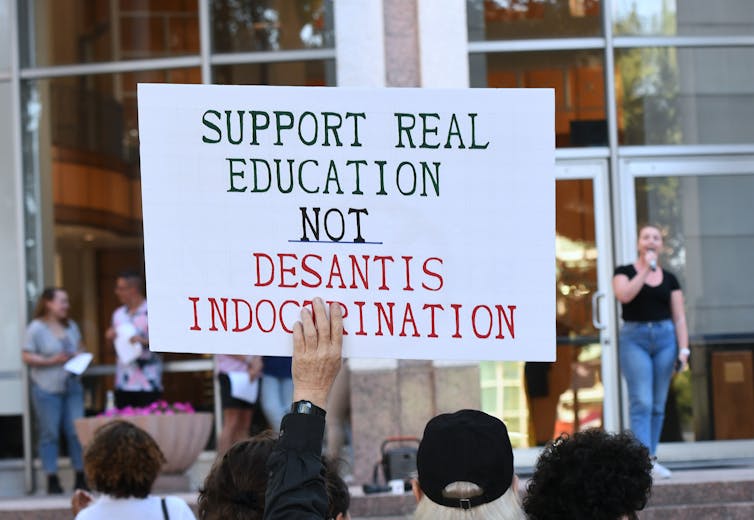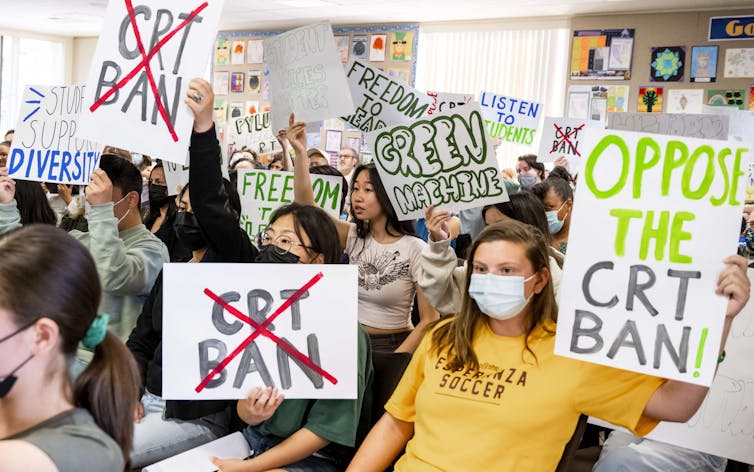Children must be taught the truth about the Holocaust, slavery and injustice
Boaz Dvir, Penn State The Florida Department of Education announced on April 10, 2023, that it had rejected 35% of the social studies books publishers submitted for approval and use in the state’s public schools.The decision garnered a great deal of media attention. But it was just the latest in a series of efforts around the country to limit students’ access to books, lessons and courses about certain historical and societal topics, often dealing with race.
At least 36 states have halted or are seeking the legal means to stop teachers from examining racism in their classrooms.
School districts around the country have banned books about issues ranging from racism to the Holocaust to the LGBTQ community. Parent groups have campaigned to restrict the instruction of such difficult topics as slavery.
Moms for Liberty, and other groups and individuals opposing the instruction of some of these topics, say they’re protecting children from divisive, identity-shaming, indoctrinating and pornographic material.
In my view, some segments of American society are turning their backs on history.
That comes at a cost. I’ve seen it firsthand. I direct Penn State programs – the Holocaust, Genocide and Human Rights Education Initiative and the Hammel Family Human Rights Initiative – that give my colleagues and me a real-time glimpse into the vulnerable state of K-12 instruction about difficult topics.
Many educators have been shying away from sensitive issues. The 2022 American Instructional Resources Survey, a survey about teachers’ views on what they can teach, by Rand Education and Labor, which focuses on school and education issues, shows the new and proposed state laws restricting the instruction of difficult topics made a quarter of the country’s 4 million teachers hesitant or downright scared to teach those subjects. This was true even when the educators taught in a state that had not at the time proposed or enacted such a law.
As a result, research shows, students may be deprived of vital lessons such as the global persistence of crimes against humanity and the the factors that give rise to genocides.
As a documentary filmmaker and assistant professor of journalism, I often discuss difficult topics with students. After a rough-cut university screening of my forthcoming documentary “Cojot,” which tells the story of Holocaust survivor Michel Cojot’s 1970s quest to kill his father’s Nazi executioner, two college students approached me apologetically, saying, “We’ve never heard of this.”
To spare them embarrassment, I noted the protagonist’s obscurity. That’s why I’ve made this film, I said.
Shaking their heads, the students stressed they’d “never heard about any of this.”
They were talking about the Holocaust.
As the grandchild of Holocaust survivors, I felt disturbed. As an educator, I wondered if we’re failing to give students the knowledge and insight they need to sustain and thrive in a 21st-century democracy.
Costly ignorance
Many Americans born between between 1981 and 2012, according to a 2020 Schoen Consulting national poll, lack “basic knowledge” of the Nazis’ murder of 6 million Jews and millions of people with disabilities, homosexuals, Romani and members of other oppressed groups. About two-thirds of respondents grossly underestimated the number of Hitler’s Jewish victims and knew little to nothing about the world’s largest-ever death camp, Auschwitz.
 |
| Students and others attend a rally outside City Hall in Orlando, Fla., to protest Florida education policies. Paul Hennessy/Anadolu Agency via Getty Images |
In May 2023, the National Center for Education Statistics released a report showing eighth graders’ grasp of U.S. history and civics has reached a historic low.
The report revealed that in 2022, only 13% of eighth graders understood historic U.S. events such as the Civil War, a 5 percentage point drop from 2018.
Few children and adults realize Europeans enslaved millions of Indigenous people throughout the Americas. Comprehension of African enslavement runs nearly as shallow. Nine out of 10 high schoolers who filled out a 2018 Southern Poverty Law Center survey failed to recognize slavery as the Civil War’s central cause.
Most of the survey’s adult respondents urged better preparation for those who teach students about slavery.
K-12 educators agree. They recurrently told my colleagues and me they need intensive training and strong support to teach sensitive subjects effectively.
Book bans
Since it began keeping tally in 2021, PEN America, which focuses on free speech in literature, has counted more than 4,000 instances of book banning in the U.S.
Its March 2023 report showed a year-over-year jump of 28.5% in the number of books banned across the country.
Banned books range from Toni Morrison’s “Beloved,” a fictional tale of freed enslaved people, to “Anne Frank’s "Diary of a Young Girl”, a nonfiction account of a Jewish girl’s life under Nazi occupation.
Although book banning may seem like a product of our polarized period, it dates back to Colonial days. These bans were last popular in the early 1980s, when Ronald Reagan was president.
Classroom constraints
Efforts to restrict what’s taught in the classroom also include bills blocking or restricting the instruction of certain sensitive issues.
 |
| Students against a critical race theory ban at their school, hold signs with language opposing the ban during a school board meeting in Placentia, Calif., March 23, 2022. . Leonard Ortiz/MediaNews Group/Orange County Register via Getty Images |
Some of the new efforts are unlikely to have a practical effect on K-12 schooling. Although 49 state legislatures aim to prohibit the teaching of critical race theory, school districts have rarely incorporated the graduate-level academic concept into their curricula.
However, some such legislative prohibitions may widen the gap between what democratic citizens need to know and what they learn in school. For decades, many experts on democracy have argued democracy suffers when officials impede the instruction of difficult topics and profits when they back it:
- Studies published by The Social Studies, a peer-reviewed journal, and the United Nations Educational, Scientific and Cultural Organization demonstrate the price of schools failing to teach the Holocaust. That failure may rob students of such imperative lessons as how propaganda can mislead, grow and wreck havoc on democracy, as well as how societies and institutions can fall apart.
- An American Civil Liberties Union report indicates putting a lid on the exchange of information about difficult topics diminishes free speech – democracy’s lifeline – and boosts discrimination – which is hazardous for a healthy society.
- UCLA’s Public History Initiative maintains the future of democracy demands a citizenship fully informed about its past.
History has demonstrated – and, in recent years, so have citizens themselves – that democracy suffers when they are uninformed. We need look no further than the Jan. 6, 2021, attack on the U.S. Capitol. People who lacked an understanding of the American electoral process participated in such acts as riots, seditious conspiracy and more while attempting to overturn the 2020 presidential election.![]()
Boaz Dvir, Assistant Professor of Journalism, Penn State
This article is republished from The Conversation under a Creative Commons license. Read the original article.
